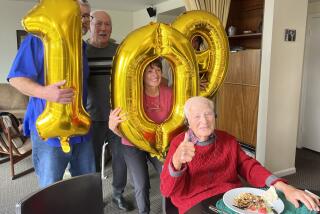Centenarian’s unlucky trip to the Games
- Share via
BEIJING — As China held the biggest coming-out party of the century last week, one of its citizens had quite a celebration of his own. Lu Xiangwu turned 100 the day the Olympics began, and he had one wish for his centennial: to come to Beijing to watch the Games.
The great-great-grandfather with a wispy white beard and barely a wrinkle did make it to Beijing, after riding 20 hours on a train from central China. But his auspicious birth date -- 08-08-08, the luckiest of numbers -- meant little in the shiny, hard Olympic city where the long-held Chinese reverence for elders is hardly enough to open doors to the hottest show in town.
With no ticket in his pocket and no connections beyond a remarkable birthday, all he got was a drive-by view of the slick new National Stadium, called the Bird’s Nest.
“I didn’t get to go inside. This is my biggest disappointment,” said Lu, sitting in a budget hotel in the shadow of the big city.
That’s all he would say about his broken dream. He didn’t want to upset his two sons, who are in their 60s. The two, plus a grandson in his 40s, had accompanied him to Beijing for his birthday.
They know he is crushed on the inside. “My father kept saying to us, ‘If you weren’t here, I don’t know if I could make it back home alive,’ ” said son Lu Zhidao, 66.
According to the younger Lus, they were let down by a businessman from their hometown in Hubei province who promised to pave the way for the elder Lu to journey to Beijing as a gesture of goodwill.
“This trip has been a farce,” said Lu Jie, the grandson. “They told us when we get to Beijing, we’ll get the red-carpet treatment. What a joke. We feel totally abandoned.”
Because the businessman also promised to get everyone into the Olympic venues, they didn’t bother to buy tickets. When they got to Beijing, they realized that the businessman was all talk. After much wrangling, one ticket emerged. For handball.
“He’s 100 years old -- he doesn’t even know what handball is,” Lu Zhidao said.
The first and only time the senior Lu had set foot in the Chinese capital was in 1961 to visit his eldest son, who was working in the city. There were no subways at the time, no traffic jams and no skyscrapers along the Avenue of Eternal Peace or anywhere else in a city that is today a museum of futuristic architecture.
Because he couldn’t get a ticket to attend the Olympics, Lu figured the least he could do was see the subway lines built for the Games. But on his first trip, the attendant pushed his wheelchair into a broken door and a metal object crashed down on his hand, leaving him bloodied and startled.
On the train to Beijing, he had cut his forehead on the railing of the sardine-like “hard sleeper” compartment, leaving his children shaking their heads about the ill-fated trip.
If they had stayed home, they might have had a comfortable view of the expensive pyrotechnics on the large TV in the family living room. Instead, on the big opening-night-slash-birthday, the Lus not only couldn’t get into the Bird’s Nest where the festivities were held, they couldn’t get the old TV in the cheap hotel to work right.
But for a man who lived through one of the most turbulent centuries in Chinese history, surviving his wife of 62 years and seeing his great-grandson become a father himself, the secret of longevity is knowing how to manage setbacks and teaching his family to always look on the bright side, even after his injuries on this trying trip.
“He told us, ‘If I didn’t get hurt, you might have gotten hurt,” Lu Zhidao said. “He is such an optimist and such a plain, simple man.”
Born the year that the last emperor ascended the throne as a toddler, Lu was the fourth son of a wealthy merchant in eastern China’s Anhui province. He received a privileged education in Confucian classics, taught at home by private tutors in long silk robes.
But the good times didn’t last. The Qing dynasty collapsed, the family fortunes crumbled, and war after war became a new way of life.
He managed to rebuild the business on a small scale, selling homemade soap and raising seven children. Then, in the middle of the last century, he watched Mao Tse-tung’s peasant army march into town wearing straw sandals. A victory by the Communists ushered in the end of private ownership. Lu had to turn the family business over to the state and become a factory worker.
Ask him what he thinks about the contradictions of a Communist government running a capitalist economy, he will say he can’t talk about things he doesn’t understand.
But one thing he knows for sure. “For my family, the past 30 years have been the best,” he said. “Our living standards improved, and there was peace compared with the past.”
The family is so low-key that it doesn’t even have a habit of celebrating birthdays. Not even to make the most of grandpa and his lucky birth date.
“We are not superstitious people,” said Lu Zhili, 61, the other son. “We will eat a bowl of longevity noodles. We just don’t do birthday parties or cakes.”
But this year was different. Ever since China won the right in 2001 to hold the Olympics, the old man had been telling everyone that he wanted to go to Beijing for the occasion.
“Sports are good for the country, good for the people and good for the body,” said the senior Lu, a big fan of Houston Rockets star Yao Ming.
After less than a week in the Olympic city, the family decided to call it quits. But his children wouldn’t let him go home so quietly.
They called the Chinese equivalent of 911. After explaining his story, the ambulance sped the great-great-grandfather off to the train station, sirens blaring.
“They were very sympathetic to us,” said son Lu Zhidao. “They were shocked and impressed that a 100-year-old man would go through all this trouble to cheer for China.”
--
More to Read
Go beyond the scoreboard
Get the latest on L.A.'s teams in the daily Sports Report newsletter.
You may occasionally receive promotional content from the Los Angeles Times.






